In independent films, such as
(500) Days of Summer, women are represented as independent and not needing of a relationship, whereas in Hollywood movies, women are represented in a stereotypical way, and require a man to help them or to be happy, and in the film
Bridget Jones's Diary: The Edge of Reason, these ideas are very obviously portrayed.
The first time that these ideas are shown is in the introduction to both of these films. In Bridget Jones's Diary, Bridget Jones is the narrator, as the film is based on her diary, and she says:
"Mark Darcy and Bridget Jones; I've found my happy ending and nothing else can spoil it."
This quote shows that Bridget Jones is happy because she is in a relationship, which is a juxtaposition of Summer in (500) Days of Summer as the first description we are given of her is:
"...Tom Hansen grew up believing that he would never be happy until he found 'the one'... The girl, Summer, did not share this belief."
From this quote, we can see that the stereotypical male/female relationship is not adhered to in this film as it is the male in the relationship who believes that you can only be happy when you find 'the one' and the woman is skeptic of this belief.
In Hollywood rom-coms, the relationship between the two main characters is a happy one, even though they have bad bits in the middle, which can be seen when Bridget says as a narrator in a voice-over near the beginning:
"Have never been happier in my entire life (billboard says: Mark and Bridget are the real thing) Bridget Darcy; Mrs Darcy; Mr and Mrs Darcy; Lord and Lady Darcy..."
However, at the beginning of (500) Days of Summer as Tom looks back on his relationship with Summer with his sister, he realizes that it was never a good relationship, and he describes the break up scene at a diner with Summer describing their relationship;
"We've been like Sid and Nancy for months now."
And as he analyses his relationship with Summer more, the audience, and Tom Hansen, both realize that although Tom may have been happy, Summer wasn't.
Another contrast that Hollywood and independent rom-coms entail is the need for a relationship. In
Bridget Jones's Diary, (29:20) Bridget grovels over Mark's voice-mail because she thinks that he is going to break up with her after a bad date, whereas in
(500) Days of Summer, Tom and one of his friends, McKenzie, are surprised when Summer says:
"I don't want (a boyfriend)... You don't believe that a woman can be free and independent?"
These two clips prove how differently women are portrayed in Hollywood and independent rom-coms; in independent rom-coms, women are seen as quite strong characters, whereas in Hollywood movies, women are seen as needing a man, or a relationship, which can also be seen when Bridget gets arrested in Thailand.
When Bridget Jones is arrested in Thailand over a drug charge, she doesn't do anything to help herself. Instead, she waits around for a man, although in this case a rather emasculated and feminine man, to help her as she talks to the inmates about stereotypical female topics, such as boyfriends, bras, and Madonna. Although no one is arrested in (500) Days of Summer, Tom Hansen starts smashing plates when Summer breaks up with him, and it is up to a strong female character to save him, such as his younger sister, who he goes to numerous times throughout the film to ask for help.
Finally, the ending of Bridget Jones's Diary: The Edge of Reason, conforms to a classic Hollywood rom-com as she and Mark walk off into the distance as she says in a voice-over:
"So as you can see, I have found my happy ending at last, and I truly believe that love is possible, even when you're 33 and have the bottom the size of 2 bowling balls."
While
(500) Days of Summer finishes with Summer marrying another man, and Tom meeting a girl who is applying for the same architectural job as him, which is a very deceiving ending because the beginning scene is him holding Summer's hand with a wedding ring on.
Casting Renee Zellweger as Bridget Jones caused a lot of controversy with the British media, as she was the American 'girl-next-door' playing a middle classed English women with a weight problem and an alcohol and cigarette problem. However, she did a lot of research for the role and won over the British audience.
Bridget Jones is slightly overweight, and Renee Zellweger is very skinny, however she consulted a doctor and to put on weight and would be driven to restaurants for high calorie lunches. She was also not allowed to exercise, and gained 20 pounds for the role.
 |
| Reporting live from a big batch of excrement |
 |
| "I like your chubby bits" |
Being American, Zellweger had to work on her accent to play the role of Bridget Jones, and so she worked with a dialect coach twice a day, who also gave her exercise to do. While staying in England, she always spoke with an English accent.
 |
| "Uncle Jeffery! Hello!" |
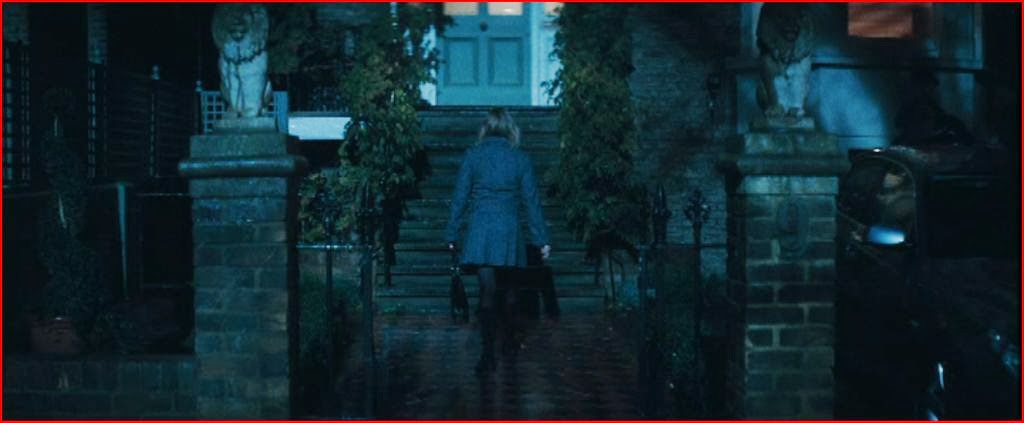 |
| Watched people walk |
For the role of Bridget Jones, Zellweger had to learn how to smoke, and she was taught how to smoke and blow the smoke away from her eyes. While she was in London, she also walked around and learnt about the mannerisms of English people, for example, the way they walk and move, and the colloquial language.
 |
| Learnt mannerisms - posture & hand gestures |
 |
| Taught how to smoke |
Mark Darcy is a very stereotypical middle classed Englishman: a man with a good job, excellent manners, and is a but of a pansy. And Colin Firth is known for playing this character, and is best known for his Role as Mr Darcy in the BBC series:
Pride and Prejudice, with the iconic moment of him walking up a hill with a wet shirt after a swim in the lake, with a similar scene in
Bridget Jones's Diary: The Edge of Reason.
Firth's role of Mark Darcy as a stereotypical Englishman is seen when he has a "fight" with Daniel Cleaver. He doesn't punch Cleaver, he pushes him, slaps him, and tries to drown him in a few inches of water when they fall into a fountain, and this ties in with him being a noble character because he is doing this for Bridget Jones. And it is also seen when he breaks Jones out of prison and tells her that he didn't do it, he was just a messenger.
 |
| "The horse was lying" |
 |
| "Are you going to come outside or am I going to have to drag you?" |
He is also very awkward and OCD about sex. When Bridget Jones calls him up and mentions their "shag" the previous night on loud speaker while he is in a meeting, he gets very awkward and cuts her off, and when he goes to bed, he always folds his underwear. Finally, when he tells Bridget the he loves her, he gets very awkward and whispers it to her.
 |
| "I've just had a rather graphic shag" |
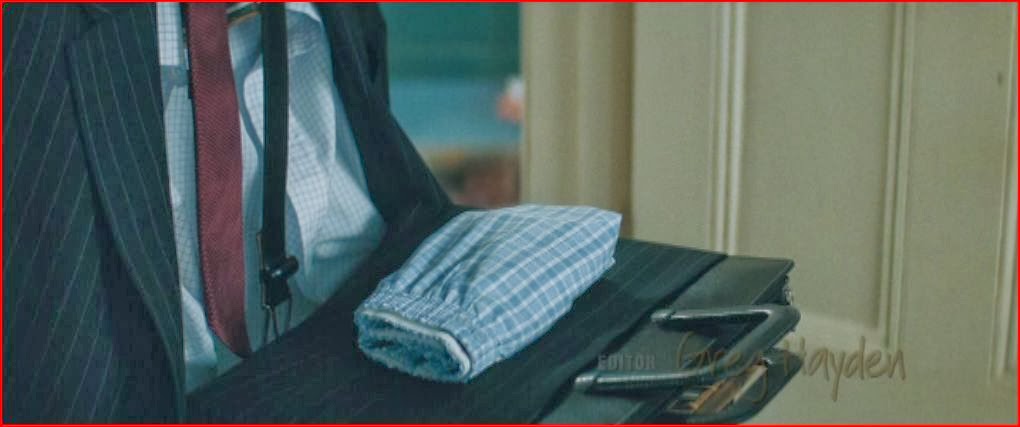 |
| Folded underwear |
 |
| "I love you for God's sake" |
Hugh Grant is another actor who was very well chosen, as his portrayal of Daniel Cleaver seems effortless, and he played the same character; a smooth talking ladies man, in
Two Weeks Notice. This trait can be seen when he manages to get Bridget Jones into bed, even though he cheated on her.
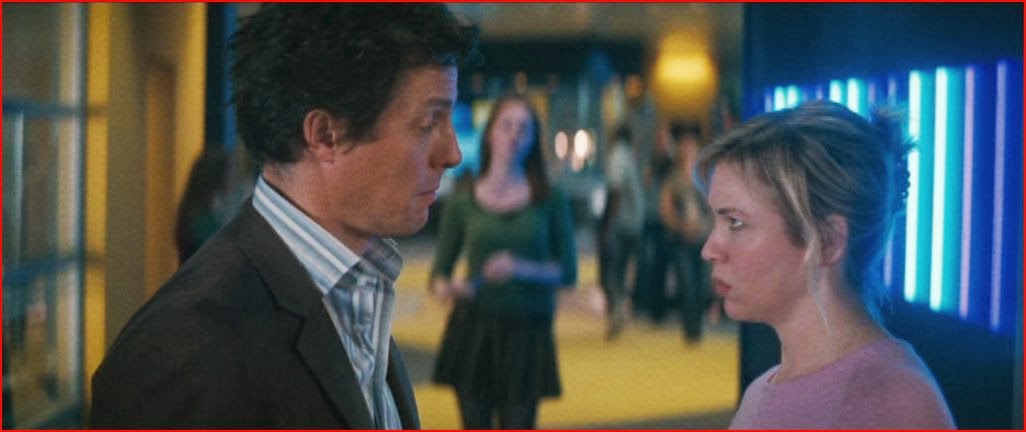 |
| Cleaver smooth talking Bridget |
 |
| Cleaver beds Jones |
 |
| "Ever fancy doing it in the dark with a complete stranger?" |
In this film, Hugh Grant represents another type of Englishman - a smooth talker who comes across as charming, but is only after sex.
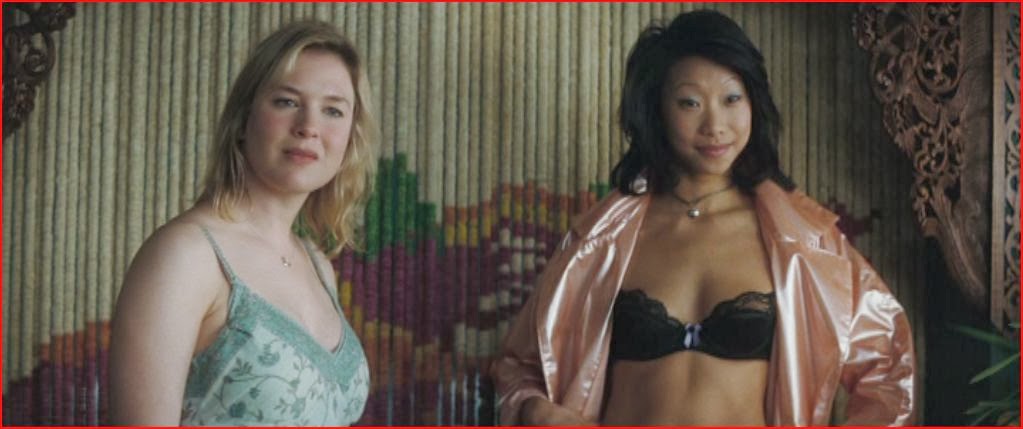 |
| "You make appointment for 10:15." |
Summer in
(500) Days of Summer is the 'girl-next-door' character, and Zooey Deschanel is known for those roles in films such as
Elf and
Yes Man. She fits the cute, kind and unassuming profile that the girl next door has, and the color scheme of the film was chosen in order to bring out her eyes.
 |
| "I love the smile" |
 |
| "Her shoe size was a little above average" |
 |
| All American girl next door |
Joseph Gordon-Levitt was a child star, however his transition from a child star to an actor was seen in the film
10 Things I Hate About You when he plays the love-struck character, Cameron, a role very similar to his character of Tom Hansen.
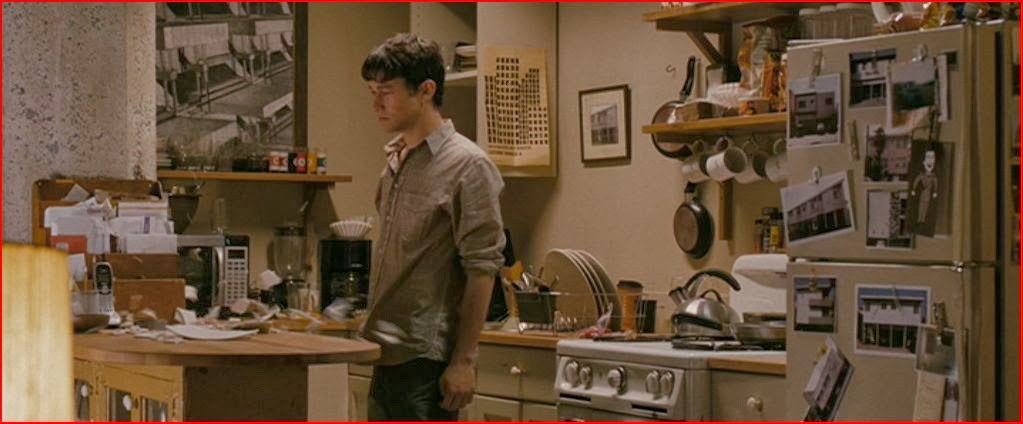 |
| Love-struck and smashing plates |
 |
| Aging hipster |
 |
| "You make my dreams come true" |
Joseph Gordon-Levitt worked with Zooey Deschanel in the summer of 2000 on a movie called
Manic, and the producer for
(500) Days of Summer liked their on-screen chemistry, and so, after casting Deschanel for the role of Summer, he offered Joseph Gordon-Levitt the role of Tom Hansen, who agreed after he read the script and heard that he would be playing opposite Zooey Deschanel.
In conclusion, women are represented as very stereotypical and require a man in their life to be happy in Hollywood rom-coms, whereas in independent rom-coms, women are represented as being independent and as having high goals in their professional life rather than their sex life, however there is a stereotypical male and female role in relationships in both Hollywood and independent rom-coms. And the actors who are chosen to play these roles are chosen based on their past performances of similar roles in other films and shows.























You can still add another 400 words to explore this further.
ReplyDeleteVery confused and lots missing - this is a Film Studies essay with no analysis of MES, Camera, Editing or Soundtrack.
There is no analysis of how these stereotypes are constructed or their purpose in the narrative, furthermore you Thesis ignores that there are modern stereotypes of independent women without any analysis of scenes that demonstrate this.
The images bear no relevance neither do the comments about actors preparation for the roles - you need to link this to picking 4 key scene from each film to compare as you were asked in your original presentation on your choice of films. The look for significance between them in how they represent gender THEN casting becomes relevant.
To improve - lots to be done, prioritise the analysis of the VISUAL elements as this is NOT an English Lit essay and you are not analysing books but MOVING IMAGES.
Clarify your Thesis and present the evidence from the films that back your statement up - your conclusion makes claims you essay never even introduces let alone presents as points.
BIG issue to address, WHY are these films different, who are they targeting Men or Women or both? How would they be read by different audiences?
17/40 E1